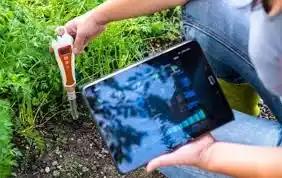Transformative Role of Technology in Sustainable Agriculture

The world has witnessed a growing need to find sustainable solutions for the challenges posed by traditional agricultural practices.
As the global population continues to rise and environmental concerns escalate, technology has emerged as a key player in revolutionizing the agricultural sector.
From precision farming to data-driven decision-making, the integration of technology into agriculture is paving the way for a more sustainable and efficient future.
Precision Farming and Resource Efficiency
Precision farming is at the forefront of the technological revolution in agriculture. Through the use of sensors, GPS, and satellite imagery, farmers can gather data about their fields’ conditions in real-time.
This data empowers them to optimize irrigation, fertilization, and pesticide application, reducing resource wastage and minimizing environmental impact.
By employing precision farming techniques, farmers can maximize yields while conserving water and minimizing chemical usage.
Smart Farming and Automation
Automation technology is rapidly transforming agriculture by replacing manual labor with smart machines.
Robots and drones can handle tasks such as planting, harvesting, and monitoring crops. This not only increases efficiency but also reduces the need for heavy machinery that can contribute to soil compaction.
By automating repetitive tasks, farmers can allocate their time and resources more effectively, leading to higher productivity and sustainable practices.
Data-Driven Decision Making
The integration of data analytics and artificial intelligence has enabled farmers to make informed decisions based on real-time insights.
By analyzing historical and current data, farmers can predict disease outbreaks, optimize planting schedules, and adjust cultivation practices.
This proactive approach reduces crop loss and promotes the responsible use of resources.
Data-driven agriculture empowers farmers to adapt to changing conditions and make precise interventions, ultimately contributing to sustainable food production.
AgroTech Startups and Innovation
The surge in agricultural technology startups is fostering innovation and collaboration in the industry.
These startups are developing novel solutions, such as vertical farming, hydroponics, and biotechnology, to address the challenges of traditional farming.
Vertical farming, for instance, allows crops to be grown in controlled environments, reducing the need for vast amounts of land and water.
Such innovations contribute to sustainable agriculture by producing more food using fewer resources.
As the world continues to grapple with food security and environmental concerns, the role of technology in sustainable agriculture cannot be overstated. From enhancing resource efficiency to enabling data-driven decision-making, technology is reshaping the agricultural landscape. By embracing these technological advancements, farmers can not only increase their yields and profitability but also contribute to a more sustainable and resilient future.
FAQs
How does precision farming contribute to sustainability?
Precision farming utilizes technology to optimize agricultural practices, minimizing resource wastage by precisely applying water, fertilizers, and pesticides. This results in higher efficiency, reduced environmental impact, and increased sustainability.
Can automation in agriculture replace human labor entirely?
While automation can handle many tasks, human intervention remains essential in agriculture. Automation enhances efficiency and reduces labor requirements, allowing farmers to focus on more strategic aspects of cultivation.
How does data-driven decision-making impact crop yield?
Data-driven decisions enable farmers to analyze trends and make informed choices about planting, harvesting, and disease prevention. This can lead to higher crop yields, reduced losses, and more sustainable farming practices.
What role do agroTech startups play in sustainable agriculture?
AgroTech startups drive innovation by developing novel solutions like vertical farming and biotechnology. These advancements offer resource-efficient alternatives to traditional farming, promoting sustainability in food production.




